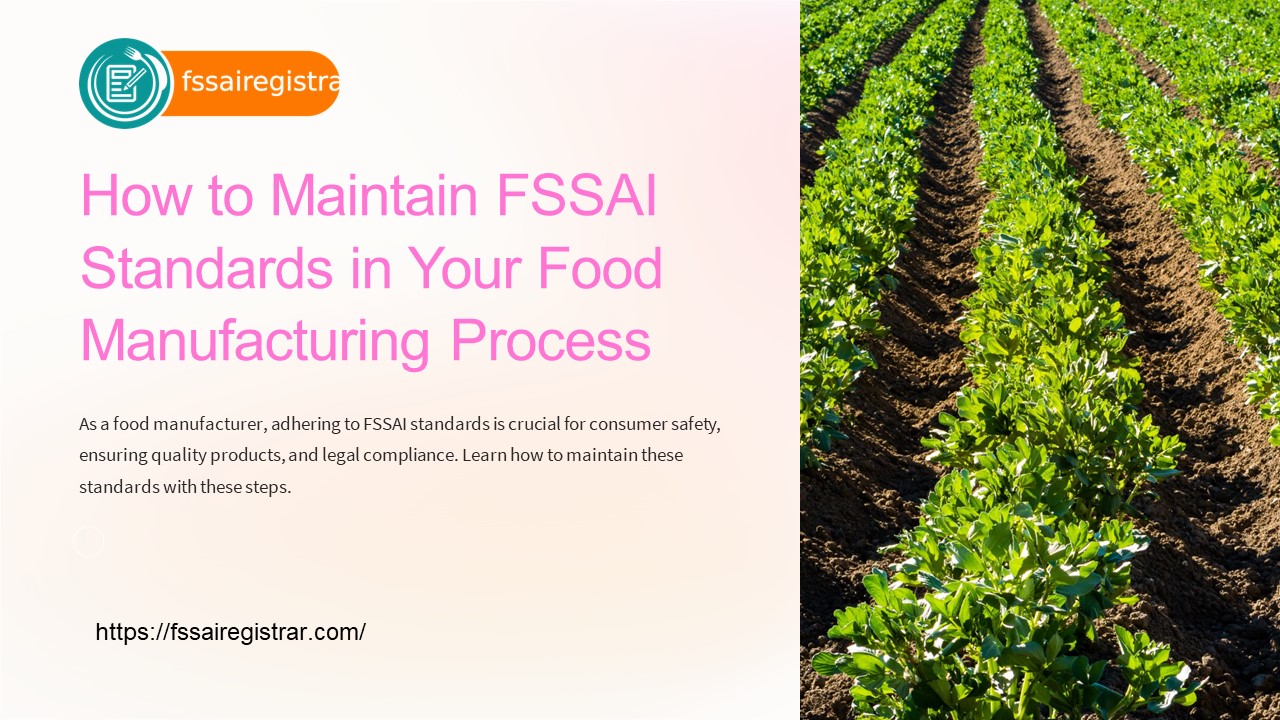How To Maintain Food Standard in your Food Business. - PowerPoint PPT Presentation
Title:
How To Maintain Food Standard in your Food Business.
Description:
To maintain food standards, implement safety systems like HACCP, follow hygiene practices, test raw materials, use FDA approved ingredients, follow packaging and labelling rules, clean equipment regularly, monitor facilities for pests, train staff on food regulations, and get audits done by FSSAI approved agencies. Following FSSAI guidelines ensures quality control and compliance. – PowerPoint PPT presentation
Number of Views:3
Title: How To Maintain Food Standard in your Food Business.
1
How to Maintain FSSAI Standards in Your Food
Manufacturing Process
As a food manufacturer, adhering to FSSAI
standards is crucial for consumer safety,
ensuring quality products, and legal compliance.
Learn how to maintain these standards with these
steps.
https//fssairegistrar.com/
2
Introduction to FSSAI Standards
Standards for Manufacturers
What is FSSAI?
Certification
Food Safety and Standards Authority of India
(FSSAI) is an autonomous body established under
the Ministry of Health and Family Welfare,
Government of India, to ensure food safety and
standards in India.
To sell food products in India, FSSAI
certification is mandatory. This certification is
granted after undergoing inspections, audits, and
food testing.
FSSAI has laid down specific standards for food
manufacturers with respect to hygiene, packaging,
labeling, storage, and distribution of food
products.
3
Importance of Maintaining FSSAI Standards
Consumer Safety
Quality Control
Legal Compliance
Non-compliance with FSSAI standards can result in
heavy penalties and even imprisonment. Therefore,
it is essential to adhere to these guidelines.
Adherence to FSSAI Certification ensures the
production of safe food products, free from
harmful chemicals, microbes, and contaminants.
FSSAI standards help maintain product integrity,
nutrition, and quality, leading to higher
customer satisfaction and brand loyalty.
4
Steps to Ensure Compliance with FSSAI Standards
1
Regulatory Assessment
Conduct regular compliance audits to identify
areas of non-conformity and initiate corrective
actions.
2
Training and Education
Provide regular training and education to all
employees involved in the food manufacturing
process to create awareness about FSSAI standards
and protocols.
3
Record Keeping and Documentation
Maintain thorough records and documentation of
all processes related to food production,
including hygiene checks, inventory, and storage,
to prove compliance with FSSAI standards.
5
Common FSSAI Violations and Consequences
- False or misleading labeling
- Use of expired or contaminated ingredients
- Non-compliance with packaging regulations
- Non-conformity with hygiene standards
- Penalties, fines, or imprisonment
6
Best Practices for Maintaining FSSAI Standards
Employee Training and Certification
Regular Audits and Inspections
Use Fresh and Safe Ingredients
Train employees in FSSAI regulations and best
practices for safety, hygiene, and food storage.
Certify them in food safety courses.
Conduct regular audits to evaluate hygiene,
quality, and safety standards. Inspect and
sanitize all equipment, machinery, and tools
regularly.
Ensure that all ingredients used in food
production are fresh, verified, and safe from
contaminants.
7
User-Friendly Tools for Maintaining FSSAI
Compliance
Online Training Platforms
Third-Party Consultants
Mobile Apps
Consult with third-party experts and food safety
consultants to ensure compliance and stay
up-to-date with regulations.
There are several mobile apps available that
allow users to access FSSAI guidelines,
regulations, and updates conveniently.
Online courses are available to certify and train
employees in food safety, quality control, and
FSSAI compliance.
8
Conclusion and Call to Action
Maintaining FSSAI standards is vital for
producing safe food products, complying with the
law, and safeguarding consumers' health. Adhering
to these guidelines is not only an ethical
responsibility but also a legal and financial one
for food manufacturers. Take these steps to
ensure your compliance with FSSAI's standards and
keep delivering quality and safe food products.































